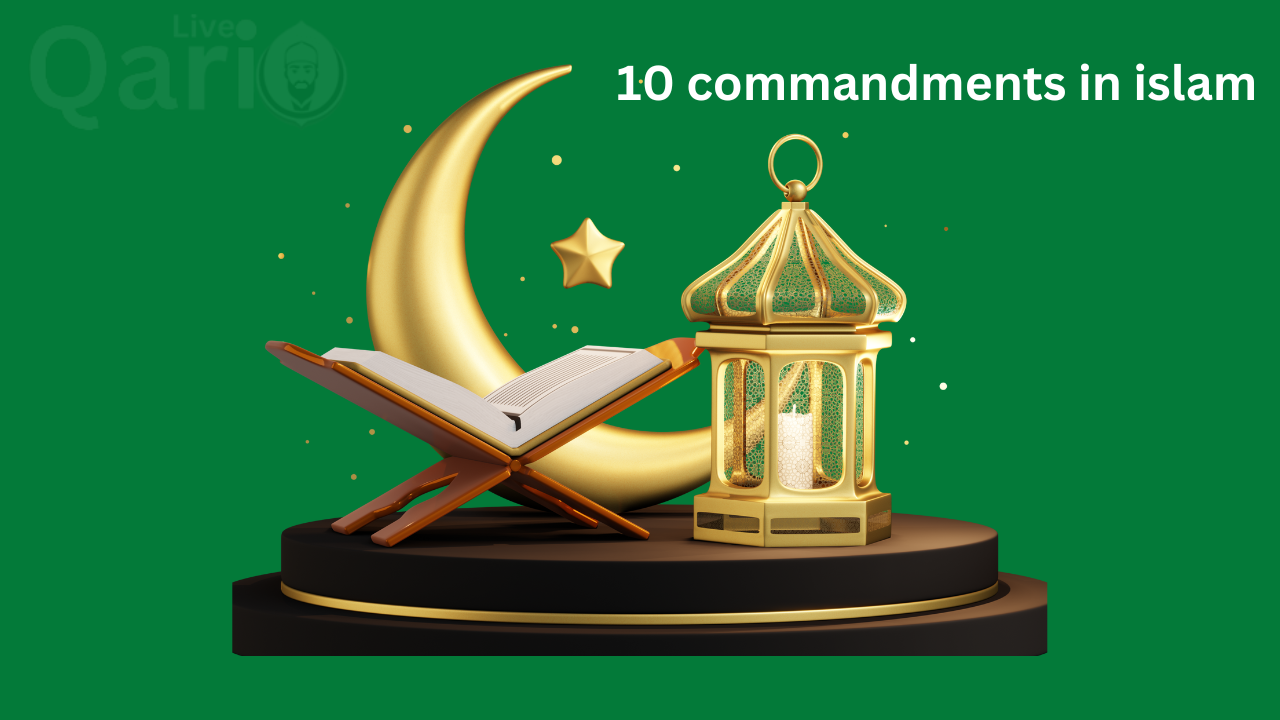
Introduction
The 10 Commandments in Islam. Islam is a religion that believes in just one God named Allah. It gives people many rules and good advice to help them be kind, fair, and pure. Even though Islam doesn’t have the same “Ten Commandments” as some other religions, it has many important rules about being a good and fair person in the Quran.
Islam’s Ethical Guidelines ( Ten Commandments in the Quran),(Moral Commandments in Islam),(Allah’s Universal Message)
The 10 Commandments in Islam are like special rules that teach us to be good and kind. They tell us not to lie, steal, or hurt others. Instead, they guide us to be honest, respect our parents, and pray to God. These rules help us be better people and make the world nicer. So, we follow them to be our best selves.
There are 10 Commandments in Islam:

| Belief in One God | No Worshipping Statues |
| Respect God’s Names | Praying and Being Good |
| Being Nice to Parents | No Hurting People |
| No Cheating in Love | No Stealing |
| Always Tell the Truth | Be Happy with What You Have |
Belief in One God (Monotheism) (Islamic Teachings on Monotheism)
Belief in one God is when we believe only one special and powerful God exists. In Islam, this is the most important thing to believe. It’s like knowing one big boss made everything, and we listen to what He says through His special messenger, Prophet Muhammad. So, we always remember that there is only one super-duper God, and we follow His teachings.

No Worshipping Statues is one of the Ten Commandments in the Quran
No worshipping statues means we don’t pray to statues or pictures. Instead, in Islam, we pray only to the one God we can’t see. We believe God is special and can’t be compared to anything else. So, we show our love and respect by praying directly to Him.

Respect God’s Name is one of the Moral Commandments in Islam.
Respecting God’s name means we use His name very carefully and with lots of respect. In Islam, we never use God’s names in a bad way or to make fun of them. We treat His names like something very special, just like we would with our names.
Want to Learn 99 names of Allah?

Praying and Being Good is one of Islam’s Ethical Guidelines.
Praying and being good are important in Islam. Muslims pray to God five times a day to show love and respect. Being good means helping others, being kind, and doing things like giving to charity. We try to improve the world by praying and being good.

Being Nice to Parents is one of Allah’s Universal Messages.
Being nice to parents is super important in Islam. It means we should always be kind, loving, and respectful to our mom and dad. They care for us, so we should be good to them, listen to them, and make them happy because they are special to us.
No, Hurting People is one of the Moral Commandments in Islam.

In Islam, we learn never to hurt or harm others unless we need to protect ourselves. Hurting others is not okay. We should always try to be kind and help each other instead. That way, we can make the world a better and happier place for everyone.
No Cheating in Love
In Islam, we learn that cheating in love is not right. When people love each other, they should be honest and loyal. Cheating can hurt feelings and make people sad, so we should always be true and kind in our relationships.

Always Tell the Truth
In Islam, telling the truth is a big deal. We should never tell lies or make up stories that aren’t true. Being honest means people can trust us, which is important in our relationships. So, always tell the truth, even if it’s hard sometimes.

Be Happy with What You Have:
Being happy with what you have means appreciating the things you already own and not wanting everything you see. In Islam, we’re taught to be content and only sometimes wish for more and more. When we’re thankful for what we have, we feel happier and make others happy too. It’s like saying ‘thank you’ for all the good things we already have.

Conclusion
While Islam does not have a direct equivalent to the Ten Commandments found in Judeo-Christian tradition, it clearly outlines moral and ethical guidelines for its adherents. These guidelines emphasize monotheism, respect for parents, truthfulness, and the prohibition of murder, theft, and adultery.
Frequently Ask Questions (FAQ’s)
What are the 10 Commandments in Islam?
There are only 10 Commandments in Islam, like in other religions. Instead, many important rules and teachings help people be good and kind.
Do Muslims have something similar to the 10 Commandments?
Yes, Muslims have important rules similar to the 10 Commandments in Islam. They include being truthful, respecting parents, not hurting others, and more.
Are the 10 Commandments mentioned in the Quran?
The exact 10 Commandments from other religions are not mentioned in the Quran, but there are similar guidelines for how to live a good and moral life.
What is the most important rule in Islam?
The most important rule in Islam is to believe in one God and follow the teachings of the Prophet Muhammad. This is called monotheism.
Are the 10 Commandments the same in every religion?
No, different religions have their own sets of rules. While some rules may be similar, each religion has unique teachings and guidelines for its followers.
People Also Asked?
What are the 10 Commandments in Islam?
In Islam, there are no exact 10 Commandments like in other religions. Instead, there are important rules and teachings to be kind and good.
Are the 10 Commandments in the Quran?
The 10 Commandments from other religions are not in the Quran, but there are similar rules for living a good life.
Does Islam have important rules like the 10 Commandments?
Yes, Islam has important rules like honesty, respecting parents, and being kind to others.
Are the 10 Commandments the same in all religions?
No, different religions have their own special rules and teachings. They are not all the same.
What’s the most important rule in Islam?
The most important rule in Islam is believing in one God and following the teachings of Prophet Muhammad. This is called monotheism.



